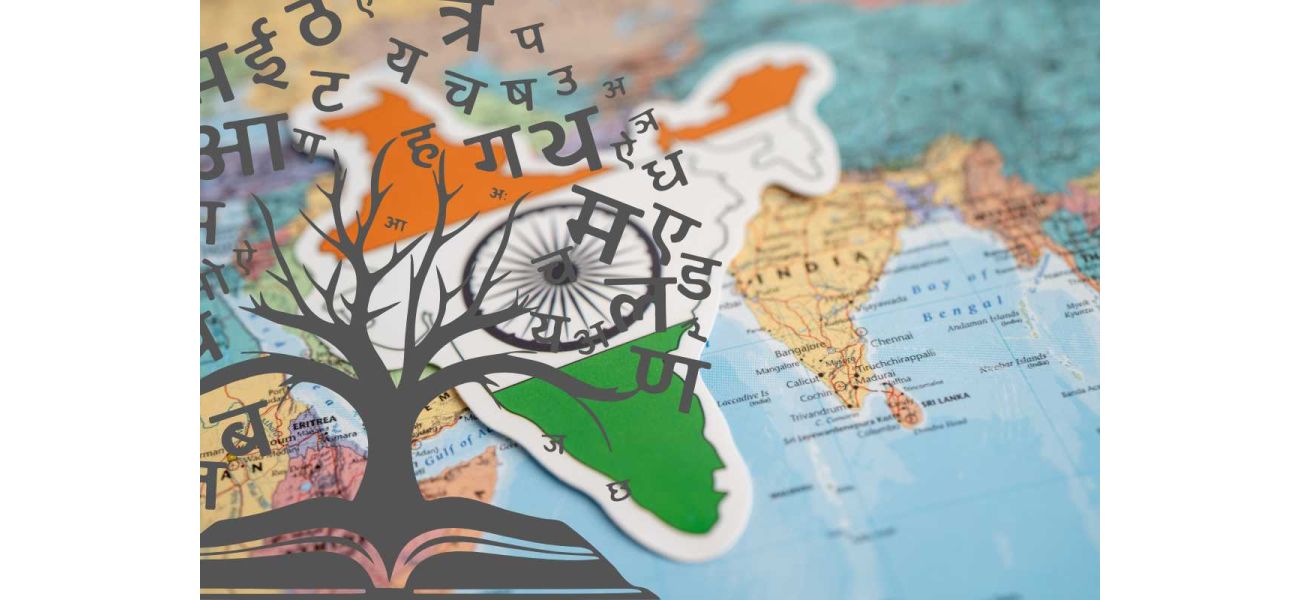The true reasons behind Southern India's opposition to making Hindi a mandatory language.
India has diverse languages and cultures, each region with its own unique identity. While Hindi is widely spoken in the north, southern states oppose making it mandatory due to fear of losing regional identity and past anti-Hindi movements.
April 5th 2025.

India is a country known for its diversity of languages, cultures, and traditions. Each region has its own unique identity, which is one of the most beautiful features of the country. One of the strongest aspects of this identity is language. While Hindi is widely spoken in the northern part of India, many southern states have consistently opposed any attempt to make it mandatory across the country. But why is this the case?
Historically, there has been a fear of losing regional identity when it comes to the imposition of Hindi. The anti-Hindi agitations of the past in Tamil Nadu, in particular, have a long-standing history of opposing Hindi dominance. This resistance is not new and has been seen in various forms over the years.
One major protest against Hindi imposition happened in the 1930s when the then Chief Minister of Madras Presidency, C. Rajagopalachari, made Hindi compulsory in schools. This was seen as an attack on the Tamil culture and sparked outrage among the people. In 1965, when the Indian government attempted to make Hindi the sole official language, massive protests erupted in Tamil Nadu. Students, politicians, and activists led strikes and even resorted to extreme measures like self-immolation. As a result, the central government had to step back and pass the Official Languages Act, which ensured that English would continue as an official language alongside Hindi.
But why do states like Tamil Nadu, Karnataka, Kerala, Andhra Pradesh, and Telangana strongly resist the imposition of Hindi? The fear of losing regional identity is one of the main reasons. It is important to understand what "imposition of Hindi" actually means. It does not mean that people are against Hindi as a language. In fact, many in the South enjoy Hindi movies, music, and can even speak the language. The issue arises when Hindi is made compulsory in schools, government exams, or used more than other Indian languages in official communication. This gives the impression that Hindi is being given preferential treatment over other languages, which is unfair in a diverse country like India.
Southern states have their own ancient and rich languages such as Tamil, Telugu, Kannada, and Malayalam. These languages are not just a means of communication, but they are deeply rooted in the region's history, literature, and culture. For example, Tamil is one of the oldest living languages in the world with a written history of over 2,000 years. Telugu is widely admired for its poetic style while Kannada and Malayalam also have their own classical traditions. Forcing Hindi in schools or administration can make people feel like their language and culture are being ignored or pushed aside. This creates a fear that their identity may slowly be erased over time. This is why the idea of making Hindi a "national language" has never been accepted in the South.
The resistance to Hindi imposition has a long history and has shaped the region's politics for decades. In the 1960s, the protest against Hindi as the sole official language of India forced the central government to rethink its policy. Instead of declaring Hindi as the only official language, it agreed to continue using English for official purposes alongside Hindi. This was done through the Official Languages Act of 1963. While this compromise helped calm tensions, the trust gap remained.
One of the main issues with the Three-Language Formula, which was introduced to promote national integration, is that it is not implemented effectively. The formula suggests that students learn one regional language, Hindi, and English. However, in practice, this often translates to students in northern states learning Hindi, English, and Sanskrit, completely ignoring southern or northeastern languages. In the South, adding Hindi to the mix can make it extra challenging for students to juggle three very different languages. This one-size-fits-all approach has been met with opposition, as it does not take into consideration the linguistic diversity of the country.
For many in the South, the resistance to Hindi imposition is not just about language, but also about equality and respect. India is a federal country where power is shared between the central and state governments. When the Centre pushes one language over others, it creates a fear that cultural and administrative control is shifting away from the states. Southern leaders have always believed in decentralization and want more power to stay in the hands of local governments. Interestingly, English is more accepted in the South and is seen as a neutral language that is useful globally, especially in fields like technology, science, and international business. Cities like Bengaluru, Hyderabad, and Chennai have benefited from English-based education and have grown into global tech hubs. For many in the South, English is a better link language than Hindi.
Another fear that people in the South have is of cultural domination. Tamil, Telugu, Kannada, and Malayalam have their own rich literary and cultural histories. There is a concern that if Hindi is made compulsory, these languages will lose their importance. Many also believe that Hindi imposition is a way to promote "North Indian dominance" over the South.
Contrary to popular belief, India does not have a national language. While Hindi and English are the two official languages used by the central government, India officially recognizes 22 scheduled languages, and each state is free to choose its own official language. Therefore, states like Tamil Nadu have the right to refuse the use of Hindi in schools or administration.
People in the South are not against Hindi speakers, but they are against the idea of making Hindi more important than other languages. They want all Indian languages to be treated equally, with respect and pride. Their demand is not for special treatment, but for fair treatment. In a country as diverse as India, true unity does not come from making everyone speak the same language, but from respecting and celebrating the differences. When each community feels that their language and culture matter, they are more likely to feel proud of being Indian.
The resistance to Hindi imposition in southern India is about protecting regional identity, ensuring fair opportunities, and respecting India's linguistic diversity. Instead of forcing one language, India should celebrate its many languages and cultures. For true unity, the government must listen to the concerns of southern states and find a balanced approach - one that does not make any community feel left out. What are your thoughts on this issue? Should Hindi be compulsory, or should states have the freedom to choose? Share your views in the comments!
Historically, there has been a fear of losing regional identity when it comes to the imposition of Hindi. The anti-Hindi agitations of the past in Tamil Nadu, in particular, have a long-standing history of opposing Hindi dominance. This resistance is not new and has been seen in various forms over the years.
One major protest against Hindi imposition happened in the 1930s when the then Chief Minister of Madras Presidency, C. Rajagopalachari, made Hindi compulsory in schools. This was seen as an attack on the Tamil culture and sparked outrage among the people. In 1965, when the Indian government attempted to make Hindi the sole official language, massive protests erupted in Tamil Nadu. Students, politicians, and activists led strikes and even resorted to extreme measures like self-immolation. As a result, the central government had to step back and pass the Official Languages Act, which ensured that English would continue as an official language alongside Hindi.
But why do states like Tamil Nadu, Karnataka, Kerala, Andhra Pradesh, and Telangana strongly resist the imposition of Hindi? The fear of losing regional identity is one of the main reasons. It is important to understand what "imposition of Hindi" actually means. It does not mean that people are against Hindi as a language. In fact, many in the South enjoy Hindi movies, music, and can even speak the language. The issue arises when Hindi is made compulsory in schools, government exams, or used more than other Indian languages in official communication. This gives the impression that Hindi is being given preferential treatment over other languages, which is unfair in a diverse country like India.
Southern states have their own ancient and rich languages such as Tamil, Telugu, Kannada, and Malayalam. These languages are not just a means of communication, but they are deeply rooted in the region's history, literature, and culture. For example, Tamil is one of the oldest living languages in the world with a written history of over 2,000 years. Telugu is widely admired for its poetic style while Kannada and Malayalam also have their own classical traditions. Forcing Hindi in schools or administration can make people feel like their language and culture are being ignored or pushed aside. This creates a fear that their identity may slowly be erased over time. This is why the idea of making Hindi a "national language" has never been accepted in the South.
The resistance to Hindi imposition has a long history and has shaped the region's politics for decades. In the 1960s, the protest against Hindi as the sole official language of India forced the central government to rethink its policy. Instead of declaring Hindi as the only official language, it agreed to continue using English for official purposes alongside Hindi. This was done through the Official Languages Act of 1963. While this compromise helped calm tensions, the trust gap remained.
One of the main issues with the Three-Language Formula, which was introduced to promote national integration, is that it is not implemented effectively. The formula suggests that students learn one regional language, Hindi, and English. However, in practice, this often translates to students in northern states learning Hindi, English, and Sanskrit, completely ignoring southern or northeastern languages. In the South, adding Hindi to the mix can make it extra challenging for students to juggle three very different languages. This one-size-fits-all approach has been met with opposition, as it does not take into consideration the linguistic diversity of the country.
For many in the South, the resistance to Hindi imposition is not just about language, but also about equality and respect. India is a federal country where power is shared between the central and state governments. When the Centre pushes one language over others, it creates a fear that cultural and administrative control is shifting away from the states. Southern leaders have always believed in decentralization and want more power to stay in the hands of local governments. Interestingly, English is more accepted in the South and is seen as a neutral language that is useful globally, especially in fields like technology, science, and international business. Cities like Bengaluru, Hyderabad, and Chennai have benefited from English-based education and have grown into global tech hubs. For many in the South, English is a better link language than Hindi.
Another fear that people in the South have is of cultural domination. Tamil, Telugu, Kannada, and Malayalam have their own rich literary and cultural histories. There is a concern that if Hindi is made compulsory, these languages will lose their importance. Many also believe that Hindi imposition is a way to promote "North Indian dominance" over the South.
Contrary to popular belief, India does not have a national language. While Hindi and English are the two official languages used by the central government, India officially recognizes 22 scheduled languages, and each state is free to choose its own official language. Therefore, states like Tamil Nadu have the right to refuse the use of Hindi in schools or administration.
People in the South are not against Hindi speakers, but they are against the idea of making Hindi more important than other languages. They want all Indian languages to be treated equally, with respect and pride. Their demand is not for special treatment, but for fair treatment. In a country as diverse as India, true unity does not come from making everyone speak the same language, but from respecting and celebrating the differences. When each community feels that their language and culture matter, they are more likely to feel proud of being Indian.
The resistance to Hindi imposition in southern India is about protecting regional identity, ensuring fair opportunities, and respecting India's linguistic diversity. Instead of forcing one language, India should celebrate its many languages and cultures. For true unity, the government must listen to the concerns of southern states and find a balanced approach - one that does not make any community feel left out. What are your thoughts on this issue? Should Hindi be compulsory, or should states have the freedom to choose? Share your views in the comments!
[This article has been trending online recently and has been generated with AI. Your feed is customized.]
[Generative AI is experimental.]
0
0
Submit Comment





